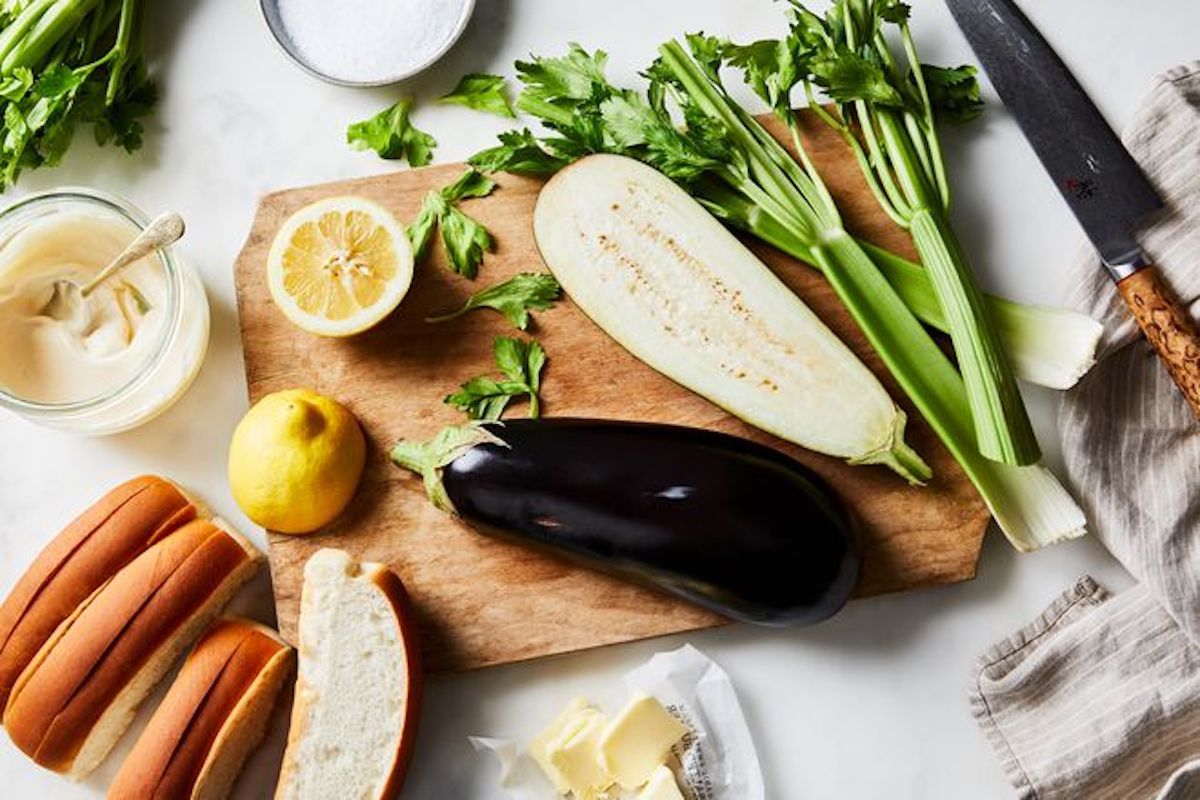As is the case with many millennials, I've spent most of my adult life dabbling in following a plant-based diet. It started in college for financial reasons, when I preferred to spend the majority of my grocery budget on produce (and, admittedly, wine) rather than on more expensive meat and fish. Once I learned more about how animal agriculture negatively impacts the environment, I continued to phase meat out of my diet — partially at times, entirely at others. I'm also a lifelong lactose-intolerant who has been deeply invested in the development of non-dairy cheese and ice cream since the early aughts. And I'm not the only one who's invested.
Plant-based diets are on the rise. It seems there's a new non-dairy "milk" on the shelves every week, and lab-grown or meatless proteins like Beyond Meat and Impossible Burgers are popping up on menus everywhere from fast-food chains to high-end restaurants. "Meatless Monday" has become as ubiquitous as "Taco Tuesday". There has never been more variety and accessibility when it comes to plant-based food; it's exciting, but can also be daunting. In the last decade, various media have continued to uncover the environmental and ethical impact of eating animals. We know that we should be eating less meat — and many already are — but when it comes to differentiating between vegetarian, vegan, and plant-based, there can be a lot of nuance. So, let's break it down.
Vegetarian vs. Vegan (and everything in between)
Vegetarianism generally abides by the following guidelines: Individuals choose not to consume meat, poultry, fish, or seafood—essentially anything that costs an animal its life. However, vegetarians still generally consume eggs, dairy, and other animal byproducts. Within vegetarianism, there are further subdivisions. Those who eat both eggs and dairy are lacto-ovo-vegetarians; those that choose eggs as their only animal-derived protein are ovo-vegetarians; and those whose only animal-derived protein source are dairy products are known as lacto-vegetarians. What about those that don't eat either dairy or eggs? Those people are technically vegans—although they only sometimes identify as such.
Veganism generally includes any individuals who choose to consume neither animal protein, nor products derived from animals. And that extends beyond the obvious meat, dairy, eggs (and honey!): Veganism typically extends beyond a diet to a lifestyle. Many vegans also choose not to purchase or wear materials derived from animals, like fur, leather, fur, wool, and even silk. They may also choose to purchase cosmetics and household products (like soaps and cleaning products) that are made without animal byproducts and have not been tested on animals. Veganism was born out of an ethical movement, so although many vegans choose the lifestyle for other reasons, animal welfare tends to be paramount to the vegan lifestyle. However, there are many individuals who follow a vegan diet and not a vegan lifestyle, as well as vegetarians who don't wear animal-derived materials and a whole spectrum of personal choices in between.
A third term, "plant-based" or "plant-rich," typically refers to diets that are proportionally higher in fruits, vegetables, and legumes than animal-derived foods. Someone who follows a plant-based diet will typically consume mostly or entirely plant-based foods — but that doesn't necessarily mean that they're completely vegetarian or vegan. They may limit or avoid animal products altogether, but also may not be entirely vegan, either in diet or lifestyle. Ultimately, it's more of a catch-all term for those who prioritize eating plants over animals, but do not wish to limit their diets to one category.
With all these labels laid out, the choice can quickly become overwhelming. At the end of the day, choosing how and what you eat, and further, what you call that diet or lifestyle, is a deeply personal choice. For me, I strive to eat intuitively rather than abide by strict rules or labels. I eat what I want, when I want it, with an underlying effort to be conscientious of both the planet and all the life it contains — human and animal. When I consume animal products, I try to do so thoughtfully, working to understand the labels at the grocery store. "Free-range," "pasture-raised," "grass-fed" can all mean different things depending on the setting and certification. I try to shop locally as much as I can, for animal and plant products. For me, talking to the vendor at the farmer's market or finding a local CSA-produce box is often more illuminating than trying to track down the sources behind grocery store offerings. Plus, you get to support people in your community, or nearby communities, who are doing the hard work to put food on your plates. All of our food comes from somewhere, and it's important to acknowledge and respect both the human and animal components of this industry.
* * *
Let's eat
When it comes to cooking, I find the most variation between diets comes not during dinner, but at dessert. Since most traditional baking is bolstered by butter, eggs, milk, or some combination thereof, vegan baking can be trickier to adapt. This article by reigning Food52 vegan expert Gena Hamshaw covers the ins and outs of vegan baking, and when to turn to vegan one-to-one substitutes. With vegan baking, I find my success rate is higher with recipes written for a vegan diet, compared to adjusting conventional recipes myself (the same thing goes, by the way, for gluten-free baking).
With that all said, it's easier — and more delicious — to follow a plant-based diet than ever before. Here's a collection of some of my favorite vegetarian and vegan recipes that are truly so delicious, you won't miss the meat (or dairy, or eggs). And forget your stereotypes: Though I love them, here's nary a lentil or piece of tofu in sight.
Vegetarian
Joshua McFadden's Bitter Greens Salad with Melted Cheese
There's a trope that all vegetarians eat are salads and pasta, to which I say, and the problem with that is . . . ? Here's a salad recipe to convert even the staunchest salad-hater. Bitter radicchio gets a shower of cheese and a quick blast under the broiler, and emerges blistered, gooey, salty, and delicious.
Crunchy-Shell Cauliflower Tacos
Food editor Emma Laperruque adapts the nostalgic, crunchy-shell ground beef taco for the modern diet (and schedule). This lightning-quick recipe smartly swaps riced cauliflower for ground beef, then seasons and serves it with the same toppings. The final result is barely distinguishable from its meaty counterpart, and guaranteed to fool even the pickiest eaters.
Khachapuri (Georgian Cheese and Egg Bread)
This dish is not only unbelievably decadent, it's also the embodiment of everything vegetarians eat that vegans do not. A simple, buttery dough encapsulates a tangy, cheesy center that gets topped with a few eggs before baking. When it comes out of the oven, rip off pieces of warm bread from the crust and use them to sop up the luxuriously creamy filling and still-runny eggs.
Vegan
Superiority Burger's BBQ Baked Gigante Beans with Polenta and Coleslaw
This recipe comes from one of my favorite vegetarian and vegan restaurants in New York, Superiority Burger. Chef and owner Brooks Headley is a magician when it comes to making hearty, exciting food without animal products. What this comforting riff on a classic BBQ plate lacks in smoked meat, it makes up with in flavor, texture, and spice.
Vegan Pasta al Limone(ish)
A vegan version of a non-vegan dish (from Food52 Editorial Lead Brinda Ayer) that actually works. It hits all the same notes as Pasta al Limone, buttery, creamy, cheesy, and of course, zesty. All of this is thanks to two heavy-hitters of vegan cooking: soaked and blended cashews and nutritional yeast.
Ovenly's Secretly Vegan Salted Chocolate Chip Cookies
As the title suggests, these cookies are a vegan's secret weapon to convincing anyone that veganism can be just as tasty as omnivorism. They're a perfect chocolate chip cookie: chewy and crisp-edged, with deep caramel notes and fat flakes of salt on top. If you're vegan, just be sure to check your chocolate chips are dairy-free (many dark chocolate chips will be.)




Shares